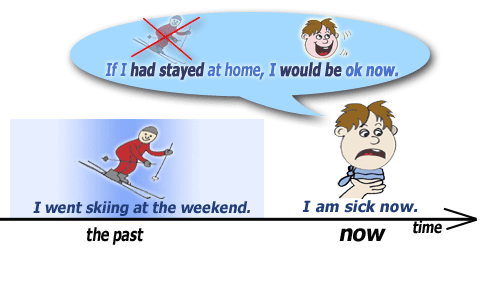The Past Unreal Conditional is used to talk about imaginary situations in the past. It is used to imagine different outcomes due to different decisions or actions in different circumstances for example:
- If I had gone out less, I would probably have studied more.
- I would have travelled more if I had had more time.
- If I had studied French at school, I would have got the job.
- Danny would have got the promotion if he hadn't insulted the boss's wife.
With the Past Unreal Conditional only 'if' can be used when the situations discussed are imaginary. 'When' cannot be used.
Giving advice
Unreal conditionals beginning with If I had been you can be used as an indirect way of giving advice. The If clause is often ommited. Unreal conditionals sound softer than modals like should have.
Advice with past unreal conditionals
(If I'd been you,) I would have left early.
Advice with modals
You should have left early.
Restating Past unreal conditionals with but
Often, a sentence with would have is used without an if condition. Instead, the main clause is joined to the true (not imaginay) sentence with but. The true sentence with but implies the unreal past condition.
True sentence with but
I would have watched the tennis match, But I had to study.
I would have left earlier, but my car didn't start.
Past unreal conditional
I would have watched the tennis match If I hadn't had to study.
I would have left earlier if my car had started.
Past Wishes
Past wish sentences refer to past situation that did not occur. They express a desire to change something that happened in the past.
Examples:
I wish the weather had been nice yesterday (it rained yesterday)
I wish you could have seen the movie. (You didn't see the movie)
Expressing regret or dissatisfaction
When you use a past wish sentence, you express regret or dissatisfaction about a past situation.
Example:
I wish I had gone to the meeting. I completely forgot about it. I wish someone had called to remind me.
Using If only
.jpg) If only is often used in place of a past wish to express strong regret. If only sentences focus on the wish to change a negative outcome.
If only is often used in place of a past wish to express strong regret. If only sentences focus on the wish to change a negative outcome.
Examples:
If only I hadn't lost my wallet!
If only the war had ended sooner!
VIDEOS

.jpg)




















